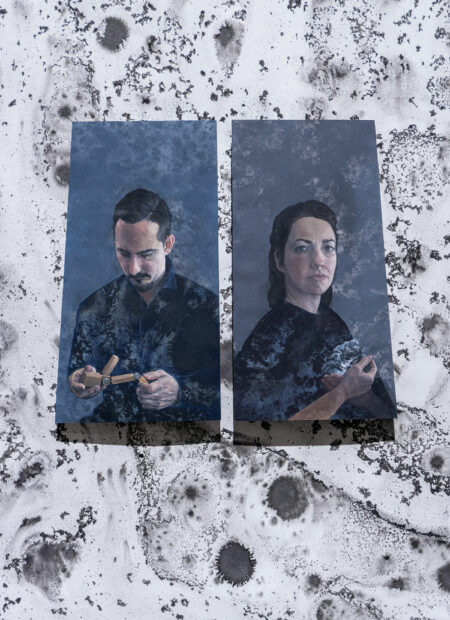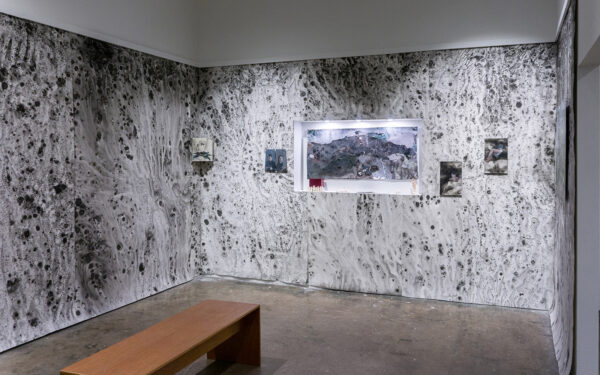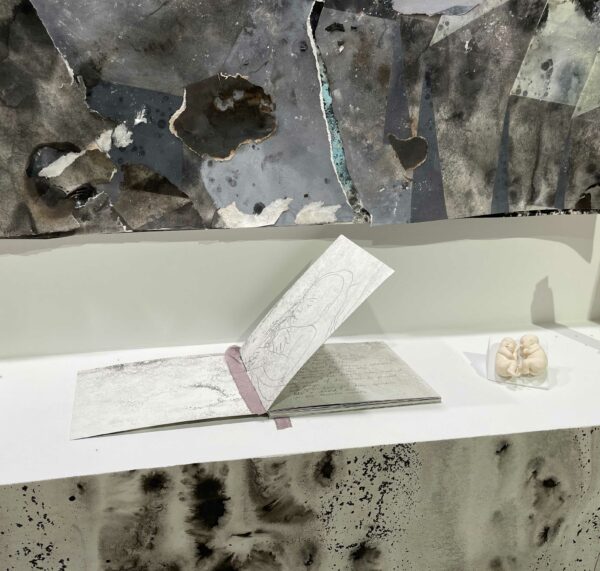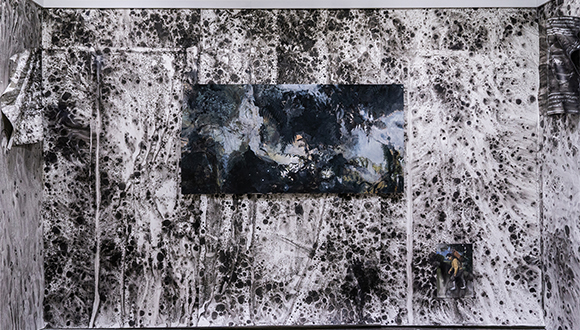Megan Harrison: From Your Brow Rise Leaf and Lyre, a solo exhibition on view at Blue Star Contemporary in San Antonio, is a deeply personal, solemn memorial that challenges traditional methods of art display and looking. The 16 mixed media works in the show represent Harrison’s experiences of trauma, loss, grief, and eventual healing. After being selected by Blue Star Contemporary to complete the Künstlerhaus Bethanien residency program in Berlin, Germany in 2019, Harrison created the works in this show amidst the ensuing COVID-19 pandemic.
In her artist statement, Harrison explains the impetus for her work: “A week before our world shut down due to COVID-19 I lost my son, born still February 23, 2020. Everything that I have made since that moment has been an attempt to find the right combination of words and images that can move matter, reverse time, to find that invisible door through which I must have tumbled.”
The exhibition space Harrison has created is dramatically different than most. Affixed on all four walls are ink-stained surfaces that camouflage the space, altering what was once white cube into an entirely different atmosphere. The blotched pieces ooze with fluidity and hang wavily, rippling among the slightest movements. Lustrous and shimmering, the dark ink-stained surfaces are a beautiful addition to the space and enliven it with a particularly shaded mood.

Megan Harrison, “I Held in My Hands the Moon,” 2021, ink and watercolors on paper, 5 x 5 inches. Photo by Jacqueline Saragoza McGilvray, courtesy of Blue Star Contemporary.
Harrison’s wall hangings provide a moment of interruption in the stale white cube that consistently defines most contemporary exhibition spaces. The works’ surfaces are tinged with loss as spilled ink comes to symbolize unfulfilled plans or desires and uncontrolled depletion.
I Held in My Hands the Moon is the first piece seen when entering Harrison’s exhibition space, as the painting protrudes from the center back wall, asserting its importance. A small, purple-colored baby with umbilical cord still intact floats in the ink-stained space surrounding the painting. Taken as a starting and central point for the exhibition, the baby depicted in I Held in My Hands the Moon can be seen as an axis mundi of the created space and surrounding work.
Two blue-gray panels, dabbled with textures that resemble the inky wall paper behind, depict the artist and her husband in a manner resembling a medieval diptych portrait. The work, The Messenger and the Mountain, shows Harrison cupping a mountain in her two hands. The nurturing manner in which Harrison is holding this object is emphasized by her direct outward gaze and protected, angled position.

Megan Harrison, “The Messenger and the Mountain,” 2021, ink and watercolor on paper, 10 ½ x 12 inches.Photo by Jacqueline Saragoza McGilvray, courtesy of Blue Star Contemporary.
A portrait of Harrison’s husband, Jimmy James Canales — whose work is exhibited in a solo show adjacent to Harrison’s — joins the artist on the left side of the diptych. Canales is depicted gazing down at a wooden toy in his hands, with his shoulders turned to face the viewer. While Canales is shown as passively pondering the mechanics of the wooden toy, Harrison is actively shielding the precious and heavy mountain in her hands as her gaze piercing the viewer. Perhaps this is a personal testament to how each parent coped with the tragedy and severe difficulties they faced together.
Additionally, however, Harrison’s diptych offers a subtle reversal of gender roles when compared to a recently reunited medieval diptych by Bartholomäus Bruyn the Elder which is on display in the Mauritshuis museum located in The Hague, Netherlands. Titled Portrait of Jakob Omphalius and Elisabeth Bellinghausen, this medieval example depicts the soon-to-be husband, Jakob, actively gazing towards his wife, Elisabeth, who is passively depicted with a far-off gaze, and gently holding a flower between her fingers. Harrison’s diptych, on the other hand, reverses the active male, passive female tradition of representation, creating a restructuring of the gendered narrative that exists in patriarchal societies.

Installation view with niche. Photo by Jacqueline Saragoza McGilvray, courtesy of Blue Star Contemporary.
In an altar-like recessed wall niche sits a variety of small sculptures and Harrison’s Book of Poems. The fragile book, which can be leafed through by visitors, is made out of a material similar to the textiles that that shroud the space’s walls and contains pencil drawings and a series of poetic writings. Most of the poems contained within include natural imagery, consistent with some of the larger paintings in Harrison’s exhibition. One poem that is especially moving reads:
Echoes turn into glaciers
Freezing in the valleys
And a distant mountain
Sings itself to sleep
It sings—world you are
More beautiful than anyone
Can ever know—
It sings to the sound of
Many stones sliding over
Many stones
It sings
Harrison’s combination of visual and written language has a complimentary function — the words not only give a context to the surrounding images in the space, but they also add an intensity to the feelings associated with her purely visual art objects. The poems interspersed throughout the exhibition are neither didactic nor conspicuous, but instead are skillfully interwoven into the fabric of the exploratory and ambiguous nature of the symbolism Harrison utilizes.

Megan Harrison, “Book of Poems,” 2020-2022, ink and graphite on paper, 5 ¼ x 7 ¼ x ¼ inches. Photo by Ashley Allen.
The exhibition’s title, From Your Brow Rise Leaf and Lyre, is a line taken from “The Gazelle,” a poem by Rainer Maria Rilke, translated by Joanna Macy. This line literally describes the form of a gazelle’s ears, which look similar to leaves, and its horns, which form the shape of a lyre. Taken more metaphorically, the lyre refers to the skills of a talented poet, as in ancient Greece lyric poetry was accompanied by the sound of the instrument. Additionally, the leaf comes to symbolize new growth, fertility, hope, and peace. Because the brow lies at the center of one’s face between the two eyes, it serves as a symbol conjuring associations with one’s subconscious or inner perception, and is spiritual in nature. As the three symbolic elements coalesce in this line of poetry, it is clear why Harrison borrows it from Rilke.
Taken in conjunction, From Your Brow Rise Leaf and Lyre lovingly offers a deeply intimate reflection on the loss and suffering endured by the artist and her family, while also providing a poetic glimpse of the struggles associated with moving forward. Recontextualizing references from medieval art, Harrison provides a rejuvenated vision of ephemerality, life, and loss.
From Your Brow Rise Leaf and Lyre is on view at Blue Star Contemporary in San Antonio until May 29, 2022.




2 comments
Fabulous. Ashley Allen has captured Megan Harrison’s artistic genius.
You got to go see this one!
I think this is one of the most sincere and honest exhibitions I’ve seen about personal loss and grief, and a human being trying to make some sort of sense of it. Beautifully done and well thought out and written article.